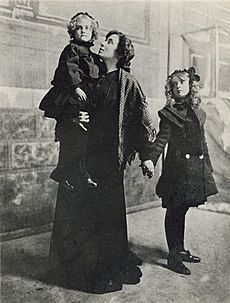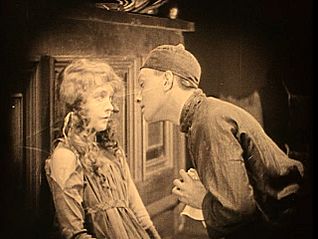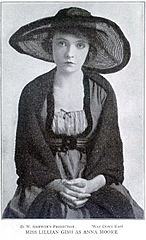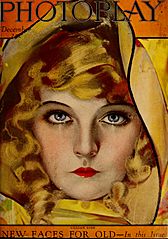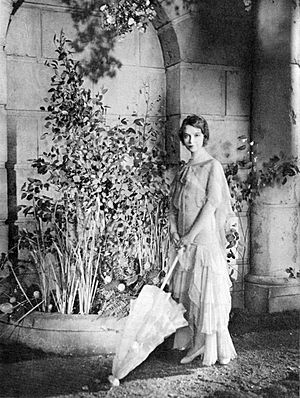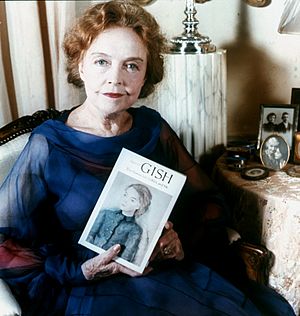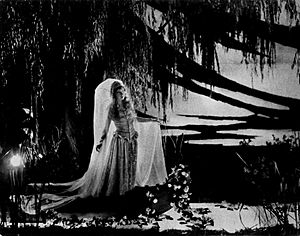Lillian Gish facts for kids
Quick facts for kids
Lillian Gish
|
|
|---|---|
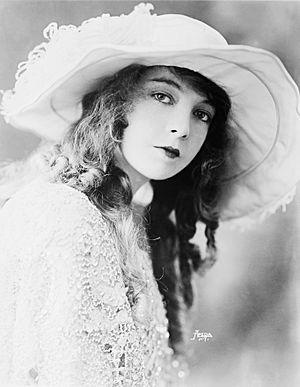
1921 publicity photo
|
|
| Born |
Lillian Diana Gish
October 14, 1893 Springfield, Ohio, U.S.
|
| Died | February 27, 1993 (aged 99) New York City, U.S.
|
| Occupation |
|
| Years active | 1902–1988 |
| Political party | Republican |
| Parent(s) |
|
| Relatives | Dorothy Gish (sister) |
| Signature | |
Lillian Diana Gish (October 14, 1893 – February 27, 1993) was an American actress, director, and screenwriter. Her film career lasted an amazing 75 years! She started in 1912 with silent films and continued until 1987. People called Gish the "First Lady of American Cinema". She helped create many basic acting techniques for movies. In 1999, the American Film Institute named Gish the 17th greatest female movie star of classic Hollywood.
Gish was a very famous film star from 1912 into the 1920s. She worked a lot with director D. W. Griffith. This included her main role in The Birth of a Nation (1915), which was the highest-earning silent film. Other big silent films she starred in were Intolerance (1916), Broken Blossoms (1919), Way Down East (1920), Orphans of the Storm (1921), La Bohème (1926), and The Wind (1928).
When movies started having sound, she went back to acting on stage. She still appeared in films sometimes. She had well-known roles in the Western movie Duel in the Sun (1946) and the thriller The Night of the Hunter (1955). She was nominated for an Academy Award for Best Supporting Actress for Duel in the Sun. Gish also had important supporting roles in Portrait of Jennie (1948), A Wedding (1978), and Sweet Liberty (1986).
She also worked a lot on television from the early 1950s to the 1980s. She ended her career acting with Bette Davis in the 1987 film The Whales of August. In her later years, Gish worked hard to help people appreciate and preserve silent films. Even though she was famous for movies, she was also a great stage actress. She was added to the American Theater Hall of Fame in 1972. In 1971, she received an Academy Honorary Award for her long career. She also received a Kennedy Center Honor in 1982 for her contributions to American culture.
Contents
Lillian Gish: A Film Star's Story
Early Life and Beginnings
Lillian Diana Gish was born on October 14, 1893, in Springfield, Ohio. She was the first child of actress Mary Robinson McConnell and James Leigh Gish. Lillian had a younger sister, Dorothy, who also became a famous movie star.
Her mother was Scottish and Episcopalian. Her father was of German Lutheran background. Many generations of Gishes before them were Dunkard ministers. Lillian's father left the family. Her mother became an actress to support them. The family moved to East St. Louis, Illinois. They lived there for several years with Lillian's aunt and uncle. Their mother opened a candy store. The girls helped sell popcorn and candy to people going to the Majestic Theater next door. The girls went to St. Henry's School and acted in school plays.
In 1910, the girls were living with their aunt Emily in Massillon, Ohio. They learned that their father, James, was very ill in Oklahoma. Lillian, who was 17, traveled to Shawnee, Oklahoma. She stayed with her aunt and uncle there and went to Shawnee High School. Her father died in 1912, but she had returned to Ohio a few months before.
When the theater next to the candy store burned down, the family moved to New York. The girls became good friends with their neighbor, Gladys Smith. Gladys was a child actress who worked for director D. W. Griffith. She later became famous as Mary Pickford. When Lillian and Dorothy were older, they joined the theater. They often traveled in different plays. They also took modeling jobs. Lillian even posed for artist Victor Maurel to help pay for voice lessons.
In 1912, their friend Mary Pickford introduced the sisters to D. W. Griffith. She helped them get contracts with Biograph Studios. Lillian Gish quickly became one of America's most loved actresses. She was 19 years old, but she told casting directors she was 16.
Becoming a Movie Star
Gish first acted on stage in 1902 in Risingsun, Ohio. From 1903 to 1904, she toured in a play called Her First False Step with her mother and Dorothy. The next year, she danced in a Sarah Bernhardt show in New York City.
After 10 years of stage acting, she made her film debut with Dorothy in Griffith's short film An Unseen Enemy (1912). At that time, many actors thought movies were not serious art. But Lillian believed in them. Gish kept acting on stage. In 1913, she collapsed from anemia during a play. Lillian was very dedicated to her art. She even got nerve damage in her fingers from acting in freezing water for a scene in Way Down East. Later, for a death scene in La Bohème, she reportedly did not eat or drink for three days.
Lillian starred in many of Griffith's most famous films. These included The Birth of a Nation (1915), Intolerance (1916), Broken Blossoms ((1919), Way Down East (1920), and Orphans of the Storm (1921). Griffith used her amazing acting skills to make her a strong, yet suffering, heroine. She appeared in over 25 short films and features in her first two years. Lillian became a huge star, known as "The First Lady of American Cinema." She often appeared in big movies based on books, like Way Down East. She became the most respected actress in early Hollywood.
She also directed her sister Dorothy in one film, Remodeling Her Husband (1920). D. W. Griffith was away filming. He told Gish he thought the crew would work harder for a woman. Gish never directed again. She told reporters that directing was a man's job. This film is now believed to be lost.
Work with MGM and Beyond
Gish left her work with Griffith in 1925. She took an offer from the new studio MGM. This gave her more creative control. MGM offered her a contract in 1926 for six films. She was offered a lot of money. She turned down the huge sum. Instead, she asked for less money and a percentage of the profits. This way, the studio could use more funds to make her films better. They could hire the best actors and writers. By the late silent era, Greta Garbo became MGM's top actress. Gish's contract with MGM ended in 1928.
Her three films with MGM gave her almost complete creative control. These were La Bohème, The Scarlet Letter (both 1926), and The Wind (1928). The Wind was Gish's favorite film from her MGM time. It did not do well at the box office because sound movies were becoming popular. However, it is now seen as one of the best silent films ever made. Even though her films were not huge hits anymore, her acting was respected more than ever. MGM still wanted her to appear in the new sound pictures.
Life Beyond Silent Films
Her first talkie was only somewhat successful. This was partly because public tastes were changing. Many leading ladies of the silent era, like Gish and Pickford, were seen as innocent. But by the early 1930s, these roles seemed old-fashioned. People preferred more daring characters. Gish was sometimes seen as "silly" or "old-fashioned." Louis Mayer wanted to create a public scandal for Gish to gain sympathy. But Lillian did not want to act both on screen and in real life. So, she returned to her first love, the theater. She acted on stage for most of the 1930s and early 1940s. She played many different roles, like Ophelia in a famous 1936 play of Hamlet.
Gish returned to movies and was nominated for an Academy Award for Best Supporting Actress in 1946 for Duel in the Sun. Her character's illness and death scenes in that film reminded people of her silent-film performances. She appeared in films from time to time for the rest of her life. A notable role was in The Night of the Hunter (1955). She played a kind guardian protecting children from a dangerous preacher.
Gish first appeared on television on February 6, 1949. She played a housemaid in an episode of The Philco Television Playhouse. She made many television appearances from the early 1950s into the late 1980s. Her most praised TV work was starring in the original play The Trip to Bountiful in 1953. In 1975, she hosted The Silent Years, a PBS show about silent films. She was also interviewed in the TV documentary series Hollywood: A Celebration of the American Silent Film (1980).
Her last film role was in The Whales of August in 1987. She was 93 years old. She starred with Vincent Price, Bette Davis, and Ann Sothern. Gish and Davis played elderly sisters in Maine. Gish's acting was highly praised. She won the National Board of Review Award for Best Actress. At the Cannes festival, Gish received a 10-minute standing ovation. Some in the film industry were upset that Gish did not get an Oscar nomination for her role. Gish herself was calm about it. She only said, "Well, now I won't have to go and lose to Cher".
Her very last professional appearance was a small voice role in a 1988 recording of the musical Show Boat. She spoke a few lines as "The Old Lady on the Levee." The last words of her long career were: "Good night."
Personal Life
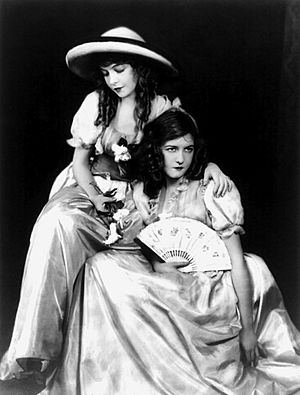
Gish never married or had children. She had a very close working relationship with D. W. Griffith. Some people thought they were romantically involved, but Gish never confirmed it. She always called him "Mr. Griffith." She was also involved with producer Charles Duell and writer George Jean Nathan.
Gish survived the 1918 flu pandemic. She got sick while filming Broken Blossoms.
Gish became a vegetarian when she was a child. This became well known in 1925 when she was seen eating a raw carrot in court. Newspaper photos of her led to a carrot-eating trend across the United States.
She stayed close friends with her sister Dorothy and with Mary Pickford her whole life. Another close friend was actress Helen Hayes. Gish was the godmother of Hayes's son James MacArthur. She also left part of her estate to Helen Hayes, who passed away just three weeks after Gish.
Gish was a very religious Episcopalian.
Political Views
Gish was a strong Republican. She was friends with President Dwight Eisenhower and his wife, Mamie. She supported Richard Nixon in his 1960 presidential campaign. She was also friends with Ronald Reagan. During Reagan's presidency, Gish wrote to Nancy Reagan, saying, "Every time you and Ronnie open your mouths you echo my thoughts."
During the time before the US entered World War II, she spoke out against the US getting involved. She was an active member of the America First Committee. This group was against the US joining the war. She said she was blacklisted by the film and theater industries. This meant she was not allowed to work. She said she had to sign a contract promising to stop her anti-war activities.
Honors and Awards
The American Film Institute named Gish 17th among the greatest female stars of classic American cinema. In 1955, she received the George Eastman Award for her great contributions to film art. She was given an Academy Honorary Award in 1971. In 1984, she received an AFI Life Achievement Award. Gish also received Kennedy Center Honors in 1982.
In 1979, she introduced her film The Wind at a screening in Los Angeles. She was a special guest at the Telluride Film Festival in 1983.
Bowling Green State University
The Gish Film Theatre and Gallery at Bowling Green State University was named after Lillian and Dorothy Gish. Lillian Gish attended the dedication on June 11, 1976. She accepted the honor for herself and her sister, who had passed away earlier. The university gave Gish an honorary degree the next day. In 1982, the University accepted a collection of Gish films and photos. These had been shown at the Museum of Modern Art. After Gish's death in 1993, the university raised money to make its gallery bigger. This was to display items received from Gish's estate.
In February 2019, the university's Black Student Union asked for the Gish Theatre to be renamed. This was because of Gish's connection to the controversial film The Birth of a Nation. In April 2019, a group recommended removing the Gish name. The university trustees voted to remove the name on May 3, 2019.
Mike Kaplan, who helped produce The Whales of August (1987), started a petition. He asked Bowling Green State University to put the names of Dorothy and Lillian Gish back on the film theater. Over 50 film industry figures signed the protest. These included actors Helen Mirren and James Earl Jones, and directors Bertrand Tavernier and Martin Scorsese.
Death
Gish died of heart failure on February 27, 1993. She was 99 years old. She was cremated. Her ashes were buried next to her sister Dorothy's at Saint Bartholomew's Episcopal Church in New York City. Her estate was worth millions of dollars. Most of it went to create the Dorothy and Lillian Gish Prize Trust.
Legacy
A special episode of the PBS series American Masters showed Gish's life and achievements.
- The Dorothy and Lillian Gish Prize is a special award.
- A street in Massillon, Ohio, is named after Gish. She had lived there early in her life. She often called it her hometown.
- François Truffaut's movie Day for Night (1973) is dedicated to Dorothy and Lillian Gish.
- The luxury hotel Maison 140 in Beverly Hills used to be the home of Lillian and Dorothy Gish. The sisters turned the mansion into a home for young actresses. They wanted to help young women coming to Hollywood.
Images for kids
See also
 In Spanish: Lillian Gish para niños
In Spanish: Lillian Gish para niños
- List of actors with Academy Award nominations
- Women's cinema
 | Percy Lavon Julian |
 | Katherine Johnson |
 | George Washington Carver |
 | Annie Easley |


